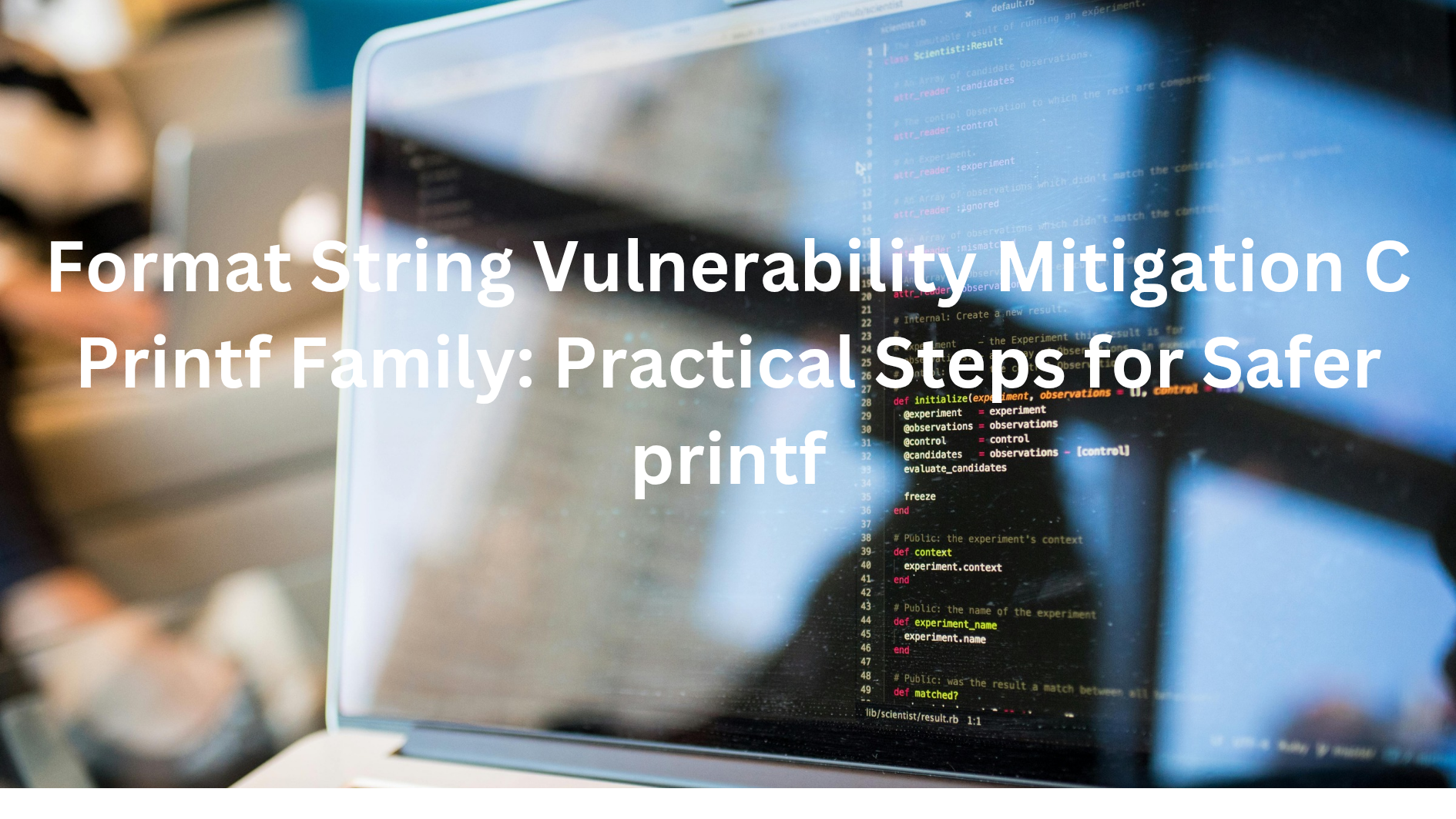
During our first few months working on a C project for tiny computers, our team ran into a problem that looked pretty simple. Our debug messages just would not print out right. We thought it was a small mistake.
But when we started looking closer, we found a big problem hiding in our old logging code, a format string bug that could have caused real trouble.
We had accidentally allowed user-controlled strings to be passed as format specifiers to printf(). What seemed like a benign log_message(user_input); turned out to be a ticking time bomb.
This experience not only forced us to rethink our approach to output formatting but also taught us critical lessons about mitigation. Here, we share those lessons.
Key Takeaway
- Never let user input directly control the format string in printf-family functions.
- Use compiler features like format checking attributes to catch errors early.
- Build wrapper functions around unsafe standard calls to enforce consistent formatting policies.
How Format String Vulnerabilities Happen
Most of us have written something like this:
printf(user_input);
It looks neat. Direct. But it’s a trap. If someone supplies %x %x %x as input, printf will start reading memory off the stack, printing whatever it finds. (1)
It gets worse. With %n, an attacker can write arbitrary values to memory. When our team first ran into this, we couldn’t believe a small omission forgetting a format specifier could open such a risk.
Why this happens:
- C’s printf family interprets the first argument as a format string.
- If user input controls the format string, printf processes any format specifiers inside.
- This gives attackers a way to read memory, crash the process, or write to memory.
It’s surprisingly easy to overlook, especially during refactoring or when adding debug code.
Safer printf Family Use: Hands-On Strategies
We learned a few hard lessons. Here’s what works.
Always Use Explicit Format Strings
Never, ever pass user-controlled data as the format string. Instead:
printf(“%s”, user_input);
Even when we feel rushed, or the input seems safe, we stick to this rule. Muscle memory helps. The difference is just a few characters, but it means everything.
Favor snprintf Over sprintf
Buffer overflows often pair with format string bugs. We use snprintf to limit how much gets written:
snprintf(buffer, sizeof(buffer), “%s”, user_input);
This prevents writing past the end of a buffer. It’s saved us more than once, especially with log messages or error strings.
Validate and Sanitize Input
Sometimes, input sneaks in from places we didn’t expect a config file, a command line argument, a network socket. We check for suspicious patterns:
- Reject or escape
%characters in user input when possible. - Limit input length up front.
- Only allow expected content, using a whitelist approach.
I remember a time we missed a single unchecked string in a legacy codebase. It led to a late-night incident review, but no breach luckily.
Practical Steps
Credit by John Hammond
Always Use Constant Format Strings
Best Practice: Never pass user input directly as the format string.
Example (Unsafe):
cSalinEditprintf(user_input); // Vulnerable!
Example (Safe):
cSalinEditprintf("%s", user_input);
Enable Compiler Format Checks
C compilers like GCC support function attributes that check format string correctness at compile time.
cSalinEditvoid log_msg(const char *fmt, ...) __attribute__ ((format (printf, 1, 2)));
Why this helps: We once caught a subtle bug where a developer passed an integer where a %s was expected. Without this attribute, it silently compiled and crashed at runtime. With it, we got an immediate warning during compilation, no debugger needed.
Create Wrapper Functions for Output
Instead of calling printf() directly everywhere, we built our own safe logging and messaging functions that enforced formatting rules.
cSalinEditvoid safe_print(const char *msg) {
printf("%s", msg);
}
Why this works: This centralizes formatting logic and makes it easier to control how user input is displayed. We also marked all unsafe variants (like vprintf()) as forbidden in our internal guidelines.
Our Mitigation Strategy: Hard Lessons Learned

We did not land on the right approach overnight. Our first attempts looked like most teams’—we thought a few warnings in the documentation would be enough. Not even close.
The first time a format string bug slipped into production, it was a log message. A late-night customer report led us to a core dump.
The root cause was a single careless printf, where we had let a user-supplied error message pass as the format string. It felt embarrassing, but it was a wake-up call.
Mandatory Format Specifiers
We have a rule: every printf-family call must use an explicit format string. No exceptions. If someone tries to push printf(user_input); into the codebase, we flag it in code review. (2)
Our linter is configured to scream at us. This is the single biggest win. It sounds simple, but it’s the line between a safe program and one where the stack gets spilled on screen.
Defensive Wrappers
We wrote our own wrappers around printf, fprintf, and snprintf. These wrappers enforce format specifiers, so even if someone is rushing, the compiler won’t let them make a dangerous call. Here’s a simplified example from our library:
void safe_log(FILE *f, const char *msg) {
fprintf(f, “%s”, msg);
}
Input Scrubbing
We do not trust any input. Not from the environment, not from config files, not from the network. We scan for % characters and reject or escape them, depending on the use case.
There was a stretch where someone argued this was overkill for internal tools. Then a test engineer found a bug by accident, pasting a string with %n into a debug panel. That convinced the last skeptics.
Buffer Length Checks
We never use sprintf anymore. Everything goes through snprintf or our own wrapper, with hard limits on buffer sizes.
If the input is too long, it gets truncated. Some of us learned the hard way that it’s better to cut off a log message than to risk a buffer overflow. Our code now reflects that ethos everywhere.
Static Analysis as a Safety Net
Automated tools back us up. Every push runs a static analyzer configured to catch format string issues. It is not perfect. It misses some edge cases, and sometimes it cries wolf. But it has caught enough real bugs that we would feel naked without it.
Peer Review and Training
We make everyone review each other’s code. We have a checklist, and “Are all format strings explicit and safe?” is right at the top.
When new people join the team, we show them actual bugs we’ve run into before in our own code. That way, they learn from real mistakes, not just made-up ones. People remember the mistakes that nearly cost us a contract or led to a late-night incident call.
Common Pitfalls and How We Avoid Them
Fixing format string bugs might sound easy when you read about it, but in real life, it’s trickier than it seems. Even we and lots of other developers have made the same mistakes more than once.
Here are some common pitfalls we’ve either experienced directly or caught during code reviews, and how we addressed them as part of our broader effort toward format string vulnerability mitigation in C printf family functions.
Logging User Messages Directly
It’s tempting to just write fprintf(logfile, msg); when logging a string, especially in quick debug changes. But this is how format string vulnerabilities sneak in. We saw firsthand how this could let attackers leak memory or even overwrite addresses if the log ever printed untrusted input.
Our Format String Vulnerability Mitigation C Printf Family policy flatly prohibits using user input as the format string. Now, our log calls always look like fprintf(logfile, "%s", msg);.
Using sprintf Instead of snprintf
Some of us had the habit of using sprintf because it felt simple and familiar. But we learned the hard way that it’s a double risk: not only can it overflow buffers, but it also amplifies format string risks when fed unchecked input.
When a crash dump showed a buffer overflow, we knew it was time to act. We changed all the sprintf() parts to snprintf() so the program wouldn’t go over the limit.
Then we added size rules and made sure the format parts were written the right way, so everything works safely.
Our Format String Vulnerability Mitigation C Printf Family checklist requires reviewers to reject any new use of sprintf.
Overlooking Indirect Input Sources
At first, we thought only network data or user forms needed scrutiny. But a bug slipped in when we read a string from an environment variable and passed it as a format string.
That wake-up call made us realize that threats can come from anywhere, not just obvious places. Now, we apply our Format String Vulnerability Mitigation C Printf Family rules to all sources config files, environment variables, or hard-to-reproduce error messages.
Ignoring Compiler Extensions
The Mistake: Not leveraging compiler tools that are designed to help. Early in our project, we weren’t using __attribute__((format(printf,...))) for custom functions, missing out on useful compile-time checks.
How We Avoided It: We adopted compiler-supported format checking for all custom wrappers. This turned out to be especially helpful in catching subtle bugs during refactors and ensured consistent enforcement of our format string vulnerability mitigation in C printf family functions.
Copy-Pasting Legacy Code
The Mistake: Legacy code can carry hidden problems, and if we reuse it without understanding what it really does, we risk bringing old bugs and security flaws into new parts of the code.
We once found an old debug_print(char *msg) function being reused across modules. Turns out, several modules were doing:
cSalinEditdebug_print(user_input); // Again, dangerous
How We Avoided It: We audited legacy code aggressively, documented insecure patterns, and replaced vulnerable APIs with safer alternatives.
During our internal training, we explicitly discussed why certain patterns were no longer acceptable and linked them back to our strategy for format string vulnerability mitigation using C printf family functions.
Conclusion
Our journey from discovering a format string bug to building safer systems with C taught us a lot not just about security, but about discipline.
Format string vulnerabilities might seem small, but they can be very dangerous. To prevent them, we need to build good habits, review code carefully, and understand how C works under the hood.
If we’ve learned anything, it’s this: treat every format string as a potential vector of attack. Because in C, even a simple string can be a weapon in the wrong hands.
If you want to learn from real world experience and strengthen, join this bootcamp.
FAQ
Why is using user input directly as a format string in printf dangerous?
Because printf interprets format specifiers, user input like %x or %n in the format string can cause the function to read or write arbitrary memory.
Our team saw this firsthand when a poorly reviewed log message began leaking stack data after someone included user input directly.
What’s the safest way to print user-supplied strings in the C printf family?
Always use an explicit format specifier, like printf("%s", user_input);. This treats the input as plain text, not as instructions. We never let this rule slide, no matter how trusted the input seems.
How does snprintf help with format string vulnerability mitigation in C?
snprintf limits the amount of data written to the output buffer, reducing buffer overflow risk. Combined with explicit format specifiers, it’s one of our core defenses in Format String Vulnerability Mitigation C Printf Family strategy.
Can format string vulnerabilities happen in error handling or debug code?
Absolutely. We learned this the hard way error paths and debug code often bypass normal review, but attackers hunt for exactly these overlooked spots.
Now, our reviews treat test and error code with the same suspicion as production logic.
Reference
- https://medium.com/@n80fr1n60/format-string-vulnerabilities-explained-from-the-bottom-up-for-32-bit-linux-part-1-3a1c4ca0dff
- https://www.invicti.com/blog/web-security/string-concatenation-format-string-vulnerabilities/

